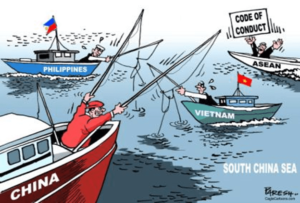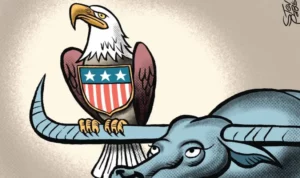THE celebration of the 20th anniversary of the Declaration on the Conduct of Parties (DOC) in the South China Sea in 2022 marked a significant milestone in the cooperation between China and the Association of Southeast Asian Nations (Asean) regarding both sides’ aspirations to manage the dispute in the SCS amicably and peacefully. It also reflects a strong resolve and commitment of Asean countries and China to peacefully resolve the SCS dispute. This reflects an ongoing commitment to peaceful dialogue and diplomacy over military confrontation.
Despite numerous challenges and frequent incidents in the SCS these days, through the DOC, China and Asean have managed to maintain a dialogue. This continued communication is essential for managing tensions and avoiding misunderstandings that could lead to military conflict and confrontation.
While the situation in the SCS has not been fully resolved, there has been incremental progress. The parties have engaged in discussions and workshops, which is a positive development, even if the pace of progress has often been slow. Over the years, there have been efforts to implement confidence-building measures, such as hotlines between countries for maritime emergencies and pledges to refrain from unilateral actions that would escalate tensions.
Moreover, the negotiations for a more binding Code of Conduct in the South China Sea have been ongoing. While progress has been slow, the fact that discussions continue is a positive sign of cooperative intentions. Note that Asean is not a monolithic entity, and member states have varied interests and levels of involvement in the SCS disputes. This diversity has made it challenging to present a unified stance at times, but the continued commitment to the DOC indicates a shared interest in managing the dispute collectively, peacefully and diplomatically.
Importance of cooperation
Undoubtedly, it is indeed imperative to emphasize the importance and necessity for China and Asean countries to work together to address the SCS issue through friendly and peaceful multifaceted consultation. This is crucial and important for several reasons.
First and foremost is for regional stability. The SCS is a strategic maritime region with significant shipping lanes and potential natural resources. Unresolved disputes could lead to tensions and conflicts that would disrupt the entire region’s stability. Second is for economic interests. Many countries rely on the SCS for trade and transportation. Cooperation ensures the unimpeded flow of goods and services, which is crucial for the economies of the region. Third is resource management. The SCS is believed to be rich in resources like fish, oil and gas. Joint development and management of these resources can be beneficial for all parties, ensuring sustainable utilization of marine resources and environmental protection. Fourth, addressing the issue through peaceful means sets a positive precedent for resolving regional and international disputes. It also aligns with international law, the United Nations Charter, including the United Nations Convention on the Law of the Sea (Unclos), which promotes the peaceful resolution of maritime and territorial disputes.
Also, friendly consultation and negotiations in resolving the SCS dispute help to build trust and strengthen diplomatic relations, not just among the countries directly involved in the dispute but also with the international community, which is invested in peaceful navigation and overflight. More importantly, to ensure that disputes do not escalate to military conflicts is in the national security interest of all countries involved in the dispute, the Asean region, and the wider Asia-Pacific. Military confrontations would be costly and could potentially draw in external powers, like the United States and its Western allies, complicating the situation further.
Certainly, through peaceful and diplomatic dialogue/negotiations, countries involved in the dispute can establish mechanisms for crisis management to prevent misunderstandings and accidental escalations that could lead to open military conflict and confrontation. It is important to emphasize that in an increasingly interconnected world, the prosperity of one nation often hinges on its relationships with others. Cooperative engagement on the SCS issue reflects and reinforces the interdependence of countries in the region. No doubt, Asean and China working together on resolving and settling the SCS dispute helps strengthen the role and effectiveness of Asean.
Asean centrality
Furthermore, as a regional bloc, Asean has a collective interest in maintaining its centrality and unity in regional security issues and dispute resolution. Its centrality plays a crucial role in addressing the dispute in the SCS for several reasons:
Asean includes several countries directly involved in the SCS dispute, such as the Philippines, Vietnam, Malaysia and Brunei. By taking a central role, Asean can work toward regional stability and security, considering the interests and concerns of these member states.
The SCS dispute involves global powers like China, the United States, and its Western alliance. Asean’s unified stance can counterbalance these larger powers, ensuring that the interests of smaller Southeast Asian nations are not overlooked in international diplomacy. Asean has mechanisms for conflict resolution, such as the Asean Regional Forum and the East Asia summit. By leveraging these platforms, Asean can facilitate dialogue, diplomacy and negotiations, which are crucial for peacefully resolving disputes.
Asean’s centrality is key in advocating for the adherence to international law, especially the Unclos. A collective Asean approach can push for the resolution of disputes within this legal framework. The SCS is a vital trade route that is crucial for Asean countries’ economies. Asean’s involvement is essential to ensure that these economic interests are protected and that the sea remains peaceful, free, and open passage for international trade.
Also, given the complex nature of the SCS dispute, Asean’s role can help de-escalate tensions and prevent the dispute from turning into a larger military conflict and confrontation.
Asean can build confidence and trust among the disputing parties through various confidence-building measures and preventive diplomacy. Asean’s involvement can garner broader international support and legitimacy for any resolution process. It can act as a bridge between the disputing parties and the international community. Most importantly, Asean, being a regional organization, has a deeper understanding of the historical and cultural nuances of the dispute, which is crucial in finding a resolution that is acceptable to all parties.
Unilateral action
Certainly, Asean centrality is vital in addressing the SCS dispute due to its role in ensuring regional stability, providing a unified voice, facilitating conflict resolution, upholding legal frameworks, protecting economic interests, preventing conflict escalation, building trust, gaining international support, and understanding the cultural and historical context of the dispute. Hence, any Asean claimant state to the SCS dispute should refrain from making any unilateral moves or devising a strategy that would undermine and destroy Asean centrality and change the status quo in the disputed SCS, for it could have several significant consequences.
A unilateral action by one member could create divisions within the organization, weakening its ability to negotiate and resolve disputes effectively, and such a move could escalate tensions in the SCS that might provoke a strong response from other claimant states or external powers, potentially leading to a more volatile and unpredictable regional situation. Asean’s role as a mediator and a central figure in regional disputes is based on its ability to maintain unity and neutrality. A unilateral move could seriously damage Asean’s credibility and effectiveness as a regional organization. Also, Asean has been working toward fostering dialogue and creating mechanisms for the peaceful resolution of disputes. Unilateral action could undermine these diplomatic efforts and prevent conflict management progress. Likewise, any unilateral move by any of the claimant states in the disputed SCS could increase tensions or instability.
Furthermore, unilateral actions might increase the risk of military confrontations, either accidentally or through a calculated response by other parties involved in the dispute, setting a precedent for other countries to take unilateral steps, leading to a breakdown of the cooperative frameworks established for the management of the SCS dispute, increasing security risks, and setting a dangerous precedent for resolving complex international disputes.
Conclusion
Truth be told, while there have been challenges and the situation of SCS remains complex, the past two decades have seen important efforts from both Asean countries and China to maintain peace and stability in the SCS through the DOC. The ongoing Asean-China dialogue, commitment to a COC, and expanding economic ties indicate a recognition of the mutual benefits of peaceful coexistence and cooperation. However, the actual impact on the ground, the future of the DOC, and the ongoing negotiations on the COC will depend on the continued commitment of all parties to its principles and their willingness to engage in constructive and proactive diplomacy. Most importantly, addressing the SCS issue through friendly and peaceful consultation is crucial for regional peace, economic stability, strategic cooperation, the promotion of international norms and laws, and the best path forward for all parties in the dispute.
Source: The Manila Times
https://www.manilatimes.net/2023/12/30/opinion/columns/why-it-is-important-for-asean-and-china-to-work-together-to-address-scs-dispute/1926089



